倒装句
倒装句知识点总结
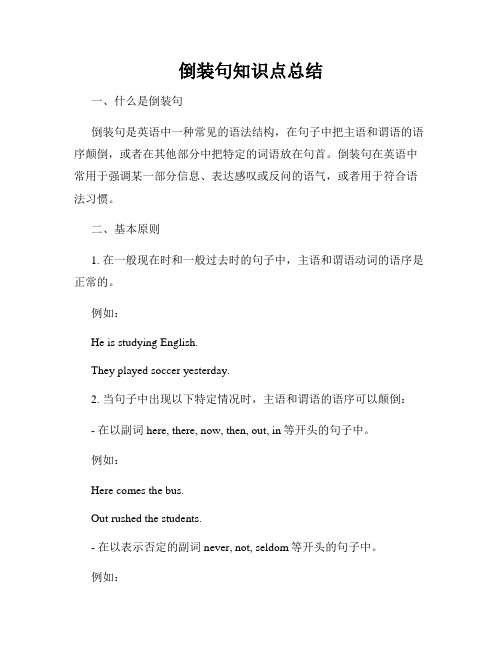
倒装句知识点总结一、什么是倒装句倒装句是英语中一种常见的语法结构,在句子中把主语和谓语的语序颠倒,或者在其他部分中把特定的词语放在句首。
倒装句在英语中常用于强调某一部分信息、表达感叹或反问的语气,或者用于符合语法习惯。
二、基本原则1. 在一般现在时和一般过去时的句子中,主语和谓语动词的语序是正常的。
例如:He is studying English.They played soccer yesterday.2. 当句子中出现以下特定情况时,主语和谓语的语序可以颠倒:- 在以副词here, there, now, then, out, in等开头的句子中。
例如:Here comes the bus.Out rushed the students.- 在以表示否定的副词never, not, seldom等开头的句子中。
例如:Never have I seen such a beautiful sunset.Not until yesterday did he know the truth.- 在以表示方向的介词短语(如in, down, up, out等)开头的句子中。
例如:In rushed the wind, blowing away the leaves.Down the stairs ran the little boy.- 在以only, hardly, little, not until等开头的句子中。
例如:Only when the sun set did they finally arrive.Hardly had I finished my breakfast when the phone rang.三、倒装句的基本结构1. 句首状语+助动词/情态动词/助动词+主语+谓语动词+其他成分。
例如:In the garden were some beautiful flowers.Never will she give up her dream.Seldom do we have guests in this house.2. 全部倒装:状语(通常为介词短语)+谓语动词+主语+其他成分。
倒装句的用法规则及例句
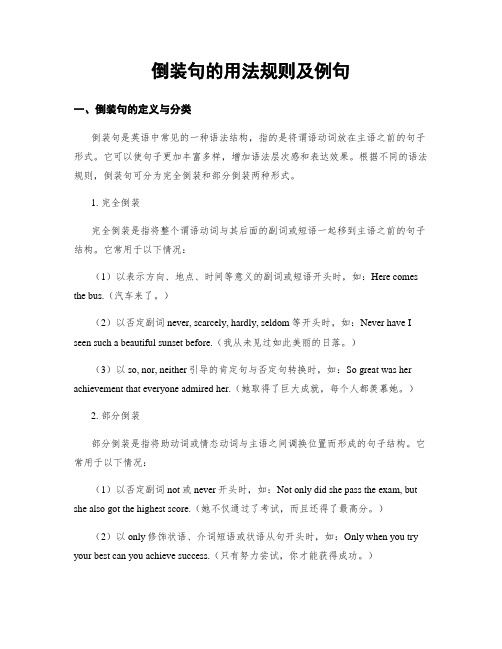
倒装句的用法规则及例句一、倒装句的定义与分类倒装句是英语中常见的一种语法结构,指的是将谓语动词放在主语之前的句子形式。
它可以使句子更加丰富多样,增加语法层次感和表达效果。
根据不同的语法规则,倒装句可分为完全倒装和部分倒装两种形式。
1. 完全倒装完全倒装是指将整个谓语动词与其后面的副词或短语一起移到主语之前的句子结构。
它常用于以下情况:(1)以表示方向、地点、时间等意义的副词或短语开头时,如:Here comes the bus.(汽车来了。
)(2)以否定副词never, scarcely, hardly, seldom等开头时,如:Never have I seen such a beautiful sunset before.(我从未见过如此美丽的日落。
)(3)以so, nor, neither引导的肯定句与否定句转换时,如:So great was her achievement that everyone admired her.(她取得了巨大成就,每个人都羡慕她。
)2. 部分倒装部分倒装是指将助动词或情态动词与主语之间调换位置而形成的句子结构。
它常用于以下情况:(1)以否定副词not或never开头时,如:Not only did she pass the exam, but she also got the highest score.(她不仅通过了考试,而且还得了最高分。
)(2)以only修饰状语、介词短语或状语从句开头时,如:Only when you try your best can you achieve success.(只有努力尝试,你才能获得成功。
)二、倒装句的用法规则1. 完全倒装的用法规则完全倒装句中,谓语动词与副词或短语置于主语之前,其主要规则如下:(1)当以表示方向、地点、时间等意义的副词或短语开头时,将动词移到主语之前。
例如:Out rushed the boys to play football.(男孩们冲出去踢足球。
倒装句
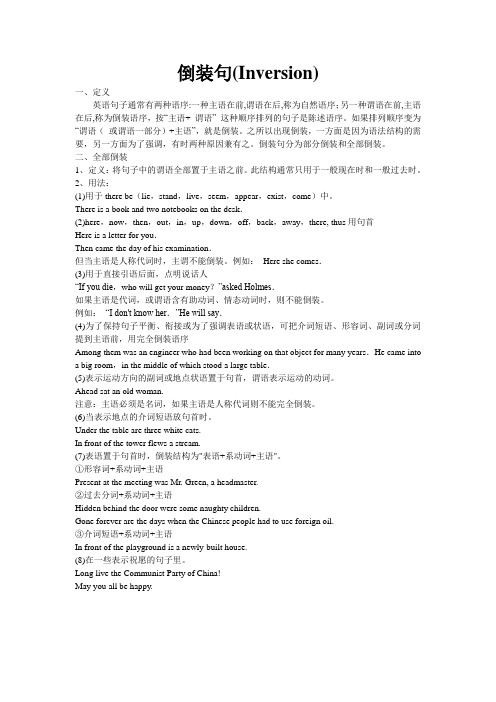
倒装句(Inversion)一、定义英语句子通常有两种语序:一种主语在前,谓语在后,称为自然语序;另一种谓语在前,主语在后,称为倒装语序,按“主语+ 谓语” 这种顺序排列的句子是陈述语序。
如果排列顺序变为“谓语(或谓语一部分)+主语”,就是倒装。
之所以出现倒装,一方面是因为语法结构的需要,另一方面为了强调,有时两种原因兼有之。
倒装句分为部分倒装和全部倒装。
二、全部倒装1、定义:将句子中的谓语全部置于主语之前。
此结构通常只用于一般现在时和一般过去时。
2、用法:(1)用于there be(lie,stand,live,seem,appear,exist,come)中。
There is a book and two notebooks on the desk.(2)here,now,then,out,in,up,down,off,back,away,there, thus用句首Here is a letter for you.Then came the day of his examination.但当主语是人称代词时,主谓不能倒装。
例如:Here she comes.(3)用于直接引语后面,点明说话人“If you die,who will get your money?”asked Holmes.如果主语是代词,或谓语含有助动词、情态动词时,则不能倒装。
例如:“I don't know her.”He will say.(4)为了保持句子平衡、衔接或为了强调表语或状语,可把介词短语、形容词、副词或分词提到主语前,用完全倒装语序Among them was an engineer who had been working on that object for many years.He came intoa big room,in the middle of which stood a large table.(5)表示运动方向的副词或地点状语置于句首,谓语表示运动的动词。
中文倒装句

中文倒装句一、倒装句指的是为了强调、突出等词语的目的而颠倒原有语序的句式。
在倒装句中,颠倒了的成分可以恢复原位而句意基本不变,句法成分不变。
二、现代汉语中常见的倒装句有:主语和谓语倒置,定语、状语和中心语倒置。
1、主语和谓语倒置主语在前,谓语在后,这是正常的、一般的语序。
有时也会颠倒过来,谓语前置,这是最常见的变式句,这种现象常见于疑问句、祈使句和感叹句,谓语和主语之间一般有停顿,书面上用逗号隔开。
构成:“谓——主”格。
这往往是为了强调谓语,或者是说话急促而先把重点说出,然后追加主语。
主语一般读轻声。
例如:(1)上哪儿找啊,你?(疑问句)(2)放心吧,爸爸妈妈!(祈使句)(3)终于过去了,中国最后一个王朝的统治!(感叹句)2、定语状语后置定语、状语在中心语前,这是正常的、一般的语序。
有时也会放到中心语之后。
后置的定语、状语限于一些“的”字短语、形容词、副词和介词短语。
构成:“中心语——定/状语”格。
例如:(1)许多外国人,到中国游历的,都特地赶来观礼这次大婚的盛况。
(定语后置,“的”字短语)(2)农民们,男的女的、老的少的,愁眉苦脸地清理着破烂的东西。
(定语后置,“的”字短语)(3)头上插着许多鲜花,横七竖八的。
(定语后置,“的”字短语)(4)他走上了领奖台,慢慢地,羞怯地。
(状语后置,形容词)(5)她站在哪儿,静静地。
(状语后置,形容词)(6)他醉熏熏地走着,摇摇摆摆地。
(状语后置,形容词)(7)同学们都来了,从祖国的四面八方。
(状语后置,介词短语)(8)他退休了吧,大概。
(状语后置副词)定语、状语后置往往是为了突出它,因而能使句子节奏更明快、更简洁有力,可变长句为短句,有时还可以起到强调、补充作用。
有时要强调状语的中心语,也会把状语放后:“他退休了吧,大概。
”。
完全倒装句结构

完全倒装句结构
1. 哇塞,Here comes the bus!(你看,公交车来啦!)
2. Out rushed the children.(孩子们冲出来啦。
就像一群欢快的小鸟一下子飞出来一样!)
3. Away flew the bird.(鸟儿飞走啦。
跟离弦的箭似的!)
4. Down came the rain.(雨落下来啦。
仿佛老天爷在泼水呢!)
5. Up went the kite.(风筝飞上去啦。
就像我们的梦想冲向天空!)
6. In came the teacher.(老师进来啦。
跟一阵风似的!)
7. Off went the lights.(灯灭啦。
哎呀,突然就黑啦!)
8. Over there stands a big tree.(那边矗立着一棵大树。
像个巨人一样呢!)
9. On the wall hangs a picture.(墙上挂着一幅画。
多漂亮呀!)
10. From the room came a loud noise.(房间里传来一阵很大的噪音。
吓我一跳!)
我的观点结论:完全倒装句结构真的很有趣呀,能让表达更加生动形象,让人一下子就感受到那种场景和氛围呢!。
倒装句语文
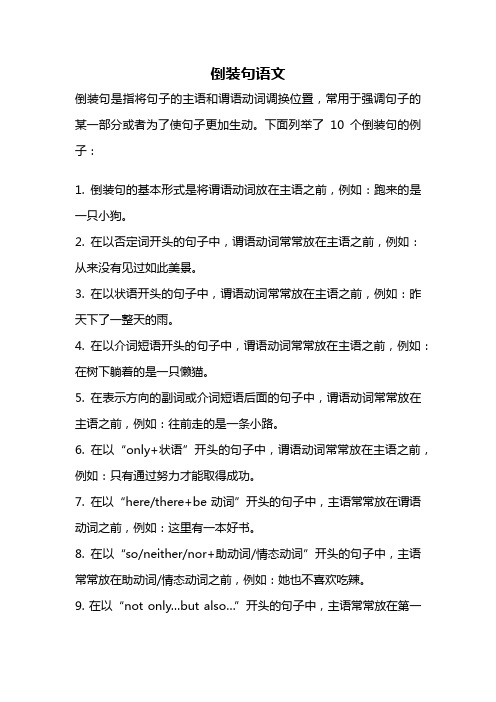
倒装句语文
倒装句是指将句子的主语和谓语动词调换位置,常用于强调句子的某一部分或者为了使句子更加生动。
下面列举了10个倒装句的例子:
1. 倒装句的基本形式是将谓语动词放在主语之前,例如:跑来的是一只小狗。
2. 在以否定词开头的句子中,谓语动词常常放在主语之前,例如:从来没有见过如此美景。
3. 在以状语开头的句子中,谓语动词常常放在主语之前,例如:昨天下了一整天的雨。
4. 在以介词短语开头的句子中,谓语动词常常放在主语之前,例如:在树下躺着的是一只懒猫。
5. 在表示方向的副词或介词短语后面的句子中,谓语动词常常放在主语之前,例如:往前走的是一条小路。
6. 在以“only+状语”开头的句子中,谓语动词常常放在主语之前,例如:只有通过努力才能取得成功。
7. 在以“here/there+be动词”开头的句子中,主语常常放在谓语动词之前,例如:这里有一本好书。
8. 在以“so/neither/nor+助动词/情态动词”开头的句子中,主语常常放在助动词/情态动词之前,例如:她也不喜欢吃辣。
9. 在以“not only…but also…”开头的句子中,主语常常放在第一
个动词之后,例如:他不仅会唱歌,还会跳舞。
10. 在以“hardly/scarcely…when…”开头的句子中,主语常常放在第一个动词之后,例如:刚出门,就下起了大雨。
以上是10个倒装句的例子,通过倒装句的运用,可以使句子更加生动有力,增强表达的效果。
倒装句是语文学习中的重要知识点,希望大家能够熟练掌握并灵活运用。
英语倒装句12种类型及例句
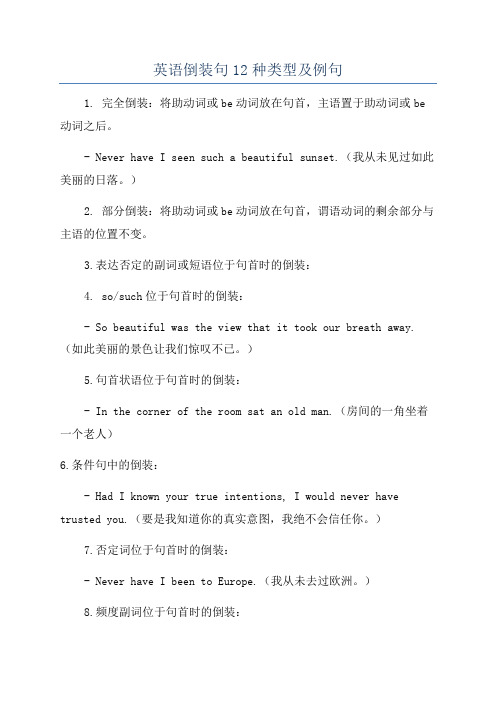
英语倒装句12种类型及例句1. 完全倒装:将助动词或be动词放在句首,主语置于助动词或be 动词之后。
- Never have I seen such a beautiful sunset.(我从未见过如此美丽的日落。
)2. 部分倒装:将助动词或be动词放在句首,谓语动词的剩余部分与主语的位置不变。
3.表达否定的副词或短语位于句首时的倒装:4. so/such位于句首时的倒装:- So beautiful was the view that it took our breath away.(如此美丽的景色让我们惊叹不已。
)5.句首状语位于句首时的倒装:- In the corner of the room sat an old man.(房间的一角坐着一个老人)6.条件句中的倒装:- Had I known your true intentions, I would never have trusted you.(要是我知道你的真实意图,我绝不会信任你。
)7.否定词位于句首时的倒装:- Never have I been to Europe.(我从未去过欧洲。
)8.频度副词位于句首时的倒装:- Rarely do we see such dedication.(我们很少见到如此的奉献精神。
)9.祈使句或祈使句部分的倒装:- Stand up!(站起来!)- Be quiet, please.(请安静。
)10. only位于句首时的倒装:- Only by working hard can you achieve your goals.(只有通过努力工作,你才能实现目标。
)11.地点状语置于句首时的倒装:- In the garden were beautiful flowers.(花园里有美丽的花朵。
)12.宾语置于句首时的倒装:- A love like this I have never felt before.(我之前从未感受过如此的爱。
句法 第六章 倒装句

4. Not until he began to work ___that he had wasted so much time.
A.didn’t he realize B. he didn’t realize C. did he realize D. he realize
5. Hardly ___the station when the train started.
2.部分倒装
(4) so/such..that句型中,若so/such放在句首,则需要部分倒装(前倒后不倒) Eg1:So shallow is the lake that no fish can live in it.
He is such a clever student that he has made great progress in English. Such a clever student is he that he has made great progress in English.
15.Never before ___ such impressive music.
A.did I hear B.have I heard C.I heard D.I have heard
A.is the cat B.the cat is C.does the cat D.did the cat
13.Only when everyone knows how serious the problem is ___ .
A.the battle will be won B.the battle has been won
11. ____, with tears in her eyes.
- 1、下载文档前请自行甄别文档内容的完整性,平台不提供额外的编辑、内容补充、找答案等附加服务。
- 2、"仅部分预览"的文档,不可在线预览部分如存在完整性等问题,可反馈申请退款(可完整预览的文档不适用该条件!)。
- 3、如文档侵犯您的权益,请联系客服反馈,我们会尽快为您处理(人工客服工作时间:9:00-18:30)。
Unit 4 Grammar:倒装句Ⅰ.回归课本(26页)1) Never_______ Zhou yang forget his first assignment at the office of a popular English newspaper.2) Not only_______ I interested in photography, but I took an amateur course at university to update my skills.3)Only if you ask many different questions ________ you acquire all the information you need to know.4)Here ______ my list of dos and don’ts.Ⅱ. 概念把______________放在主语之前,叫倒装结构。
如果__________放在主语之前, 叫全部倒装; 如果只把_________________等放在主语之前,叫部分倒装。
Ⅲ. 语法归纳(结合课本89页语法)巧记倒装(一)这里那里、这时那时、上来下去、出来进去、两离开。
(二)强调表语和状语。
(三)否定副、连放句首。
(四) so, nor, neither, 也如此。
(五) as (though), 引导让步句。
(六) only 修状位句首切牢记。
一、完全(全部)倒装【指把句子的全部谓语放在主语前】1.there be句型中, 其中be可换做appear/enter/come/exist/happen/lie/remain/stand/seem等动词。
There stands a temple on the top of the mountain. 山顶上有一座寺庙。
2.以地点副词here/there,时间副词now/then及方位副词out, in, up, down, away,off 等开头,且谓语动词多为be/come/go,常使用完全倒装以示强调。
【这些副词可巧记为:这里那里(here/there)、这时那时(now/then)、上来下去(up/down)、出来进去(out/in)两离开(away/off)。
】Here comes the bus.汽车来了Now comes our turn. 现在轮到我们了Out went the children.孩子们出去了There goes the bell.铃响了【注意】若主语是人称代词时,主谓不倒装。
Away it went.它走了Here you are.给你Down they flew.它们飞了下来3.表地点的介词短语或表方位的副词短语位于____,且谓语动词是be/come/go/lie/sit、stand/run/walk等不及物动词时,常用完全倒装。
【为了保持句子的平衡或为了强调表语和状语,或使上下文紧密衔接,把它们放在句首,用完全倒装。
(该结构不需加助动词。
)】East of the town lies a beautiful lake. Present at the meeting were all teachers.In a lecture hall of a university in England sits a professor.Outside the doctor’s clinic were twenty patients. West of the lake are two villages.二、部分倒装【指把句子的部分谓语(be动词/助动词/情态动词)放在主语前】1.含有否定意义的副词或词组,如hardly (scarcely), never, not, not only, not until,little, seldom,rarely,in no way(决不能)等放_____作状语时,或在no sooner…than…和hardly…when…句型中,no sooner和hardly放_______时句子要部分倒装。
(1)Hardly (Scarcely) ____ he reached the station when the train started.(2)Not once did we visit the city of our own.(3)Seldom in all my life _________ I met such a determined person.(4)Not only _______there no electricity, but also no water.(5)Not until he shouted at the top of his voice __________ she turn her head.(6)In no way can they leave here.他们决不能离开这儿。
2.______ 或________放在句首,表示前面说话的情况也适用于另一个人(物),即“也(也不),如此”,用倒装句。
【谨记:“so+助动词/连系动词/情态动词+主语”表示“...也一样”,“neither/nor+助动词/连系动词/情态动词+主语”表示“...也不”】(1) She is busy doing her homework.. So ____ her brother.(2) You passed the exam. So _________I.(3)He doesn’t like shopping. Neither _________ I.(4) He can’t speak any foreign language. Nor__________his father.3.由___________引导的让步状语从句中,其基本句式为:"形容词/副词/名词+as+主语+谓语"或"动词原形+as+主语+情态动词/助动词"。
(1) Child as he is, he knows a lot of English.(2)_______ _______ ______ ________ (虽然他们年老), they stuck to working.(3)_______ _______ ______ ________, (虽然他努力尝试)he couldn't lift the stone.(4)Try as I might, I couldn't lift the stone.4.________所修饰的副词、介词短语或状语从句放在句首,用倒装句。
(1)Only after three operations was she able to walk without sticks.(2)Only then __________we realize that the man was blind.(3)Only by seizing every minute __________we finish it on time.【注意】1)当Only修饰主语位于居首时,句子不用倒装。
Only the teachers are allowed to borrow books from the school library.只有老师才被允许从学校图书馆借书。
Only she can solve the problem. 只有她能解决这个问题。
2)当Only修饰状语从句时,从句不倒装,主句倒装。
Only when he came back did I know the truth.直到他回来时,我才知道了真相。
5. 在so / such …that 的结构中,若so/such 置于句首,则句子部分倒装.1) It is such an interesting book that John has read it twice.=Such an interesting book ______ ________that John has read it twice.2) My brother is such a clever boy that he can work out some problems that I can’t.=Such __ ____ ___ __ ___ ______ that he can work out some problems that I can’t.3) It is so interesting a book that John has read it twice.=So interesting a book _______ ________ that John has read it twice.4) He run So fast that nobody could catch up with him.= So fast ____ ____ ____ that nobody could catch up with him.6. 在省略了if 的虚拟条件句中,将were,had或should移到主语前构成部分倒装。
1)If you had reviewed your lessons, you might have passed the examination=Had you reviewed your lessons, you might have passed the examination.2)If you should need more information, please let me know.= _________________________________, please let me know.3)If I were you,I would do the work.= _____________, I would do the work.Ⅳ.Practice(挑战自我)1、请填写正确的助动词(be, have, had,do ,did, will)1 Never ___________ I forget the hospitality of the family in Tibet.2 Not until she spoke __________I realize she was a foreigner.3 Only then___________ we realize that the man was blind.4 Seldom in my life ___________ I met so determined a person.5 Noon sooner ___________I left my house than it began to rain.6 Not only ___________he read the book, but also remembered what he read.7 Never ___________ I been there.8 Only then __________I begin my work on designing a bridge.9 Not only ________ I interested in photography, but I took an amateur course.10 Below____________ a restaurant.2.把下列句子改为倒装。
